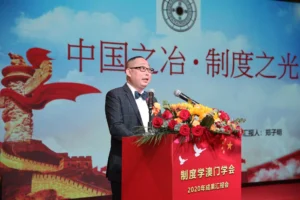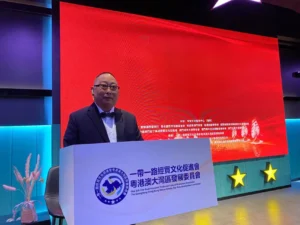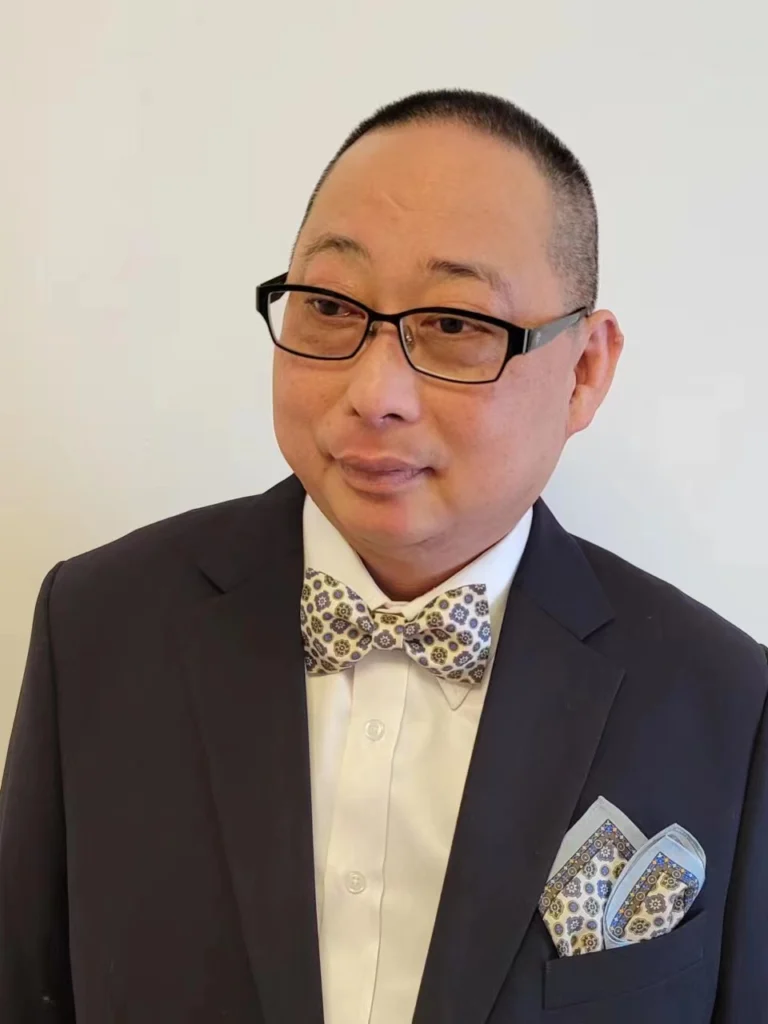– What is your background and professional experience?
Jorge Chiang – I grew up as an apprentice in Macau and my profession is in finance. When I was about 10 years old, I was an apprentice in an electronics store; and in the evenings, after school, I learned how to make contact lenses at the then famous New Era Oculista. I was later trained as a producer and sound engineer at the Macau Catholic Center, and subsequently spent most of my time in mainland China and different parts of the world. During my time as an employee of Wo Kee Hong Ltd. in Hong Kong, I served as secretary and general manager of the Zhuhai Holiday Resort.
– How do you intend to use this background at the Praia Grande Palace?
J.C. – There are many ways, because I’ve been trained in many aspects, and I see that Macau is currently facing many problems that I can solve; including finance, or engineering. Everyone says that Macau is digging up the roads until they go crazy, but it doesn’t have to be that way.
– What are the main problems in Macau? Can you give us examples, in finance and engineering – the areas you mentioned – of how you plan to solve them?
J.C. – There are many. In fact, I’m also collecting complaints from Macau residents. The solutions are very simple, but they are not well coordinated. For example, in the case of road works, some departments should coordinate to dig only once; when they do it twice or three times, for different reasons. Based on my experience, if you do all the necessary work at once, it can take at least ten years before you have to dig again. Doing it every time a different reason arises may have an effect on the builder’s turnover; but in fact, it’s a huge waste of public funds. There’s no need to do it this way.
– From a financial point of view, what solutions do you propose?
J.C. – I’ve been working in international finance for almost 40 years, and Macau does have advantages in the area of international finance. But it doesn’t know how to use them; it doesn’t want to, or doesn’t dare to. There is a lot of monopolization and a lack of responsiveness. When certain people monopolize a sector, the future is not cultivated, which is why the younger generations, who study abroad, have no opportunities for development in Macau.
– Do you disagree with the financial modernization implemented by the government?
J.C. – That’s not a complete solution. Finance is an area that works in complementarity with others; for example, combined with research into traditional Chinese and Western medicine. If I take office, I will increase the number of universities; including a high intelligence institute, to cultivate the IQ and EQ of all students to the limit. There is also the cultural aspect, which Macau has not addressed properly. We should promote Macau as a platform to showcase China’s 5,000-year-old cultural heritage and 56 ethnic minorities. There is also the rich cultural and commercial exchange with Portuguese-speaking countries. They always talk about it, but they don’t walk the walk. If I can get there, I’ll immediately start working on these different aspects, with several small teams.

– During your 40 years of experience in the financial sector, what specific areas have you been involved in?
J.C. – I started with stocks and futures, under the guidance of the head of the Zhuhai Holiday Resort; and then I moved on to banking, linked to accounts and other financial operations. I’m very familiar with how the different financial systems work.
– When you announced your intention to run, you said that Macau needs to enter a “new era” and “start everything from scratch”. What do you mean by that?
J.C. – A new era, first and foremost, means a better standard of living for Macau residents. Given the GDP we have, there shouldn’t be any poor people; however, the reality is that in the last year and a half, many people have committed suicide due to the pressure of the cost of living. Of course, high prices are caused by monopolies in certain sectors – and these problems need to be addressed. Even if I don’t become Chief Executive, I can sit down and teach each Secretary how to do their job. The question is whether they are willing to implement the changes. “Starting from scratch” means stopping the bad examples of the past and present and improving them, gradually, one by one. For example, the import of goods, especially food, has been monopolized by certain people. If I get the job, I will immediately set up a small team to lower food costs by sourcing Macau directly from mainland China, or elsewhere, at the lowest possible cost to serve the population. This attitude is the most basic, because the cost of living in Macau is currently more expensive than in Hong Kong. How can the population afford that? In my time, we were very happy in Macau.
– Is this approach feasible? Since most of the food is imported by a Chinese state-owned company, won’t there be conflicts of interest?
J.C. – It is feasible, just like the efforts against corruption in mainland China. Macau is no exception. In fact, many times we Macanese dare to be indignant, but we don’t speak out because of certain circumstances. Since I’m standing for election, I have to speak on behalf of all Macao citizens; and I will take up any issues with the Central Government.
– What do you think of the new gaming concessions? Does the current model bring economic diversification?
J.C. – It’s very conservative. In fact, it doesn’t need to be that way. Personally, I think that having several licenses doesn’t make sense – one gambling concession would be enough. The rest should be awarded to those who have the capacity; to those who can pay a certain gambling tax every year and apply. In addition, every year, the government should audit the reports of these companies to check their economic performance. This is how real competition can be created.
– Wouldn’t that lead to monopolies?
J.C. – No; competition is the engine of progress. In the past, Macau only had one gambling concession – and the number of tables you got was based on the capacity of that company. If its annual revenue and tax contribution couldn’t meet the government’s demands, it would have to leave the market. It wouldn’t become a monopoly, but would allow many potential operators to emerge.

– How do you see the fact that many small and medium-sized companies are in difficulty at the moment?
J.C. – There has to be a solution. It’s often a question of technology and a lack of capital. In addition, entrepreneurs need to continue training and identify their weaknesses in order to optimize them and add more capital.
– If you become Chief Executive, do you intend to grant subsidies to SMEs?
J.C. – Yes, definitely.
– What is your position on preserving the Portuguese and Lusophone communities, bilingualism, and relations with Portuguese-speaking countries? Is Macau on the right track?
J.C. – The central government has always wanted Macau to play a unique role in this bridging relationship, and even friendship. If I take office, on behalf of the SAR Government, I will set up representative offices in Portuguese-speaking countries, negotiate resources in those countries and align them with operations in the Greater Bay Area. In this way, everyone can win and achieve common prosperity. However, this idea has always been talked about, but not put into practice. As for the proportion of use of Chinese and Portuguese, I estimate it could be 50-50. In business with Portuguese-speaking countries, the use of Portuguese will not be reduced.
– You announced your candidacy last week, but when did you realize you wanted it and could do it? Are you confident?
J.C. – Of course I am. If I wasn’t confident, I wouldn’t have applied all of a sudden. The main reason is that I’ve seen the serious monopoly situation that has been going on in Macau over the years. Many Macanese, with their entire families living in Macau, don’t dare to speak out. What’s going to happen? The new generation of Macanese will leave, and Macau will no longer have local residents. Fighting for the well-being to which the people of Macau should be entitled is equivalent to fighting for what Macau should be entitled to from the central government.
– It’s not official, but sources close to Ho Iat Seng say he will run for a second term. Do you think he can beat the current Chief Executive?
J.C. – Well, it depends on what. If it’s a question of ability, I certainly won’t lose to him. He was born with a golden spoon in his mouth; I’m a handyman with screwdrivers and hammers. At least I’m in touch with the grassroots while he’s not. I’m confident of securing the support of the members of the Electoral Commission. As for the vote count, we’ll have to wait and see.
– Can you single out one positive – and one negative – thing about the current administration?
J.C. – No positive points; just a long list of negative points. That’s why I have to run.
– How do you see relations with Beijing and what level of autonomy do you advocate for Macau?
J.C. – Actually, as far as I know, the Central Government has always been very discreet about Hong Kong and Macau. It’s just that we ourselves have not been diligent, which has led to many things having to be managed by the Central Government. It’s like parents, who may not want to intervene; but if the children keep misbehaving, they are forced to intervene. At first glance, Macau appears to be the obedient child; but in reality, many things have been done in a chaotic manner; and that has to do with its top leader.



